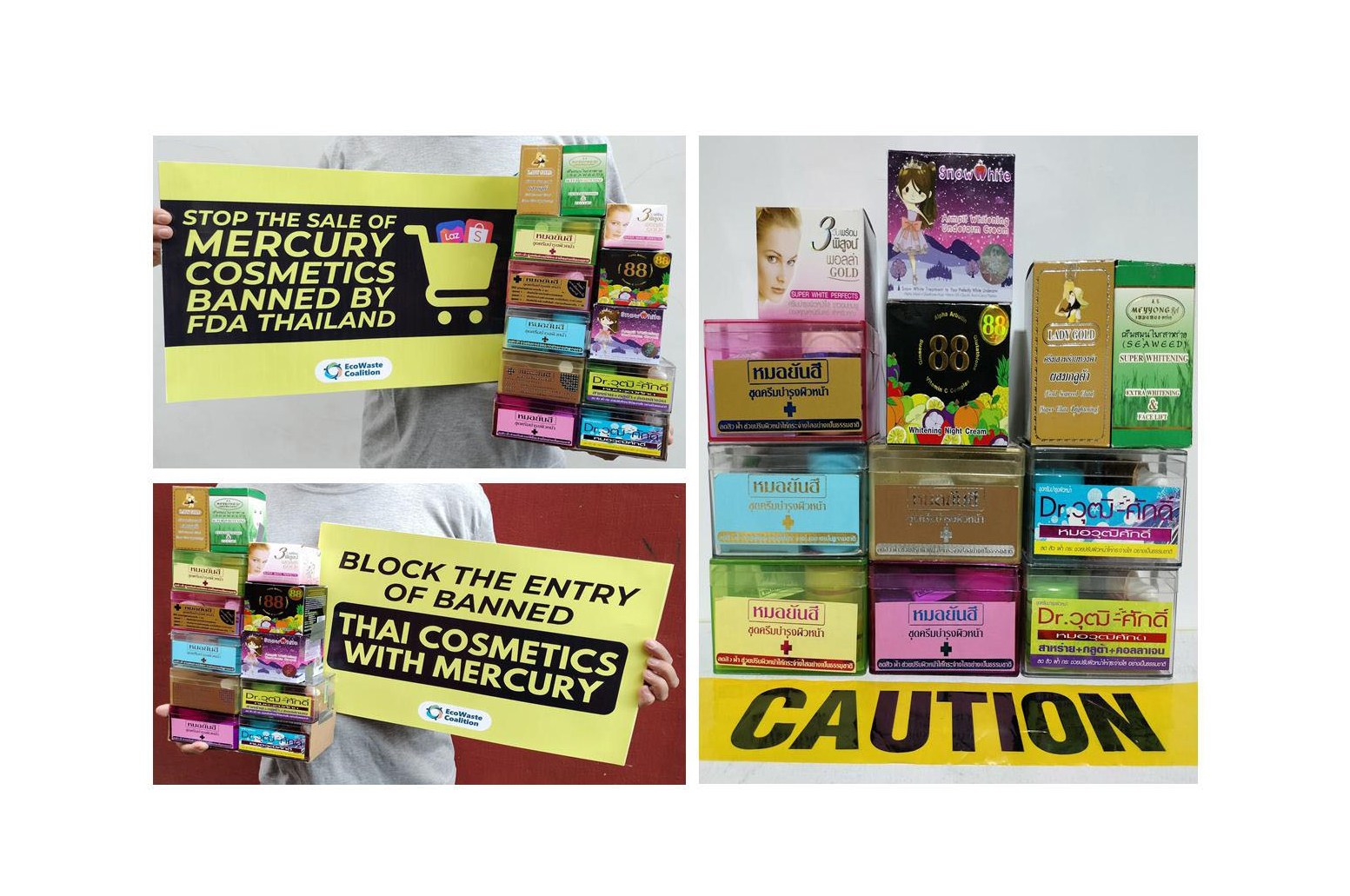EcoWaste Coalition to BOC: Please Stop the Dumping of Banned Mercury Cosmetics

(Group raises the red flag on toxic cosmetics from Thailand, Pakistan, and China)
6 October 2024, Quezon City. Dismayed by the alarming influx of contraband cosmetics laden with highly toxic mercury, the EcoWaste Coalition urged the Bureau of Customs (BOC) to step in and stop the dumping of dangerous cosmetics, particularly from Thailand, Pakistan, and China, into the domestic market.
Through a letter sent over e-mail to BOC Commissioner Bienvenido Rubio, the toxics watchdog group requested the BOC “to block the entry of contraband cosmetics tainted with mercury, which continues to enter into our ports and the local market, including online shopping platforms.”
Such products often contain mercury, a forbidden ingredient in cosmetics, way above the legal limits of one part per million (ppm) for mercury as a heavy metal contaminant under the ASEAN Cosmetic Directive, and 15 ppm for mercury waste under the Minamata Convention on Mercury.
Prior to reaching out to the BOC, the group wrote to the Food and Drug Administration (FDA) to report the upsurge in the number of product listings for mercury-containing skin lightening products from Thailand on online shopping platforms Lazada and Shopee.
The group’s letters to the BOC and FDA were sent ahead of the 9.9. online shopping sales. “With the BOC and the FDA at the helm and with support from other agencies and sectors, including the e-commerce sites, we can stop the dumping of these poisonous skin products with mercury, which threatens our people’s health and the environment, too,” the EcoWaste Coalition said.
“Our request for action was prompted by the apparent rise of online sellers on both Lazada and Shopee that offer banned Thai cosmetics, particularly mercury-laden Dr. Yahnee, Dr. Wuttisak, Lady Gold, Meiyong, and 88 Whitening Night Cream,” the group said.
The above products belong to the 12 cosmetics banned by FDA Thailand for containing mercury and other undeclared controlled ingredients such as betamethasone, hydroquinone, and retinoic acid. These 12 products, by the way, were among the 14 tainted products reported to FDA Thailand in February 2023 by the EcoWaste Coalition, Ecological Alert and Recovery Thailand (EARTH), Foundation For Consumers (FFC) and the International Pollutants Elimination Network – Southeast and East Asia (IPEN-SEA).
The surge in online product listings came on the heels of a policy issuance by Thailand’s Ministry of Health updating the country’s list of banned substances in cosmetics, including mercury. It was published in the Royal Gazette on February 28, 2022 and became effective after its publication the following day. The notification provides for a grace period of 180 days for products manufactured or imported before the effective date. The ban on mercury cosmetics took effect after the grace period in August 2022.
The completion of the said grace period would most likely explain the increased number of product listings from local online sellers for mercury-containing cosmetics imported from Thailand, the EcoWaste Coalition surmised.
Last week, the FDA Philippines issued public health warnings against FDA Thailand-banned Dr. Yanhee’s facial skincare sets for being sold online without proper market authorization.
In addition to the FDA Thailand-banned products, the group also urged the BOC to intercept unauthorized Pakistan-made cosmetics with mercury, particularly Goree Beauty Cream with Lycopene, Goree Day & Night Beauty Cream, and Goree Gold 24K Beauty Cream, which have flooded online and physical cosmetic stores across the country despite being banned by the FDA through multiple advisories.
From 2013-2024, health product regulators in Brunei, Singapore, Hong Kong, Bangladesh, New Zealand, United Kingdom, and the USA have likewise banned Goree Beauty Creams for being contaminated with mercury, a chemical that can inhibit the body’s production of melanin, resulting in a lighter skin tone.
Despite the prohibitions imposed in many countries, including the Philippines, unauthorized and banned Goree products can be easily obtained from online dealers in Lazada, Shopee, Facebook, Instagram, and Tiktok, making Goree the most advertised mercury-laden skin lightening product sold online.
China-made skin lightening products containing mercury in excess of 1 ppm, the limit under China’s Safety and Technical Standards for Cosmetics, can also be purchased from online sellers and in some retail stores.
Mercury use in skin lightening products can lead to adverse health effects, including, skin rashes, uneven skin color, and scarring, and can lower skin’s resistance to bacterial and fungal skin disorders. Chronic exposure to mercury in tainted products can cause damage to the kidneys, brain, and nervous system.
Symptoms of mercury exposure may include tremors, numbness and tingling in hands, feet, or around the mouth, irritability, shyness, insomnia, memory deterioration, concentration difficulty, impaired hearing, vision loss, depression, etc. In serious cases, renal failure may occur. (PR)
Reference:
https://iris.who.int/bitstream/handle/10665/330015/WHO-CED-PHE-EPE-19.13-eng.pdf?sequence=1
https://enviliance.com/regions/southeast-asia/th/report_5639
https://www.cirs-ck.com/en/new-chinese-standard-for-cosmetics-published







